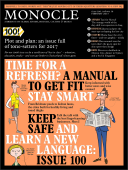
Issue 100
Plot and plan: an issue full of tone-setters for 2017. For our 100th issue we do a world tour of ‘best in class’ – in urbanism, education, media – and even get limber in Switzerland’s finest gyms.
In This Issue
Oops! No content was found.
Looks like we no longer have content for the page you're on. Perhaps try a search?
Return Home

